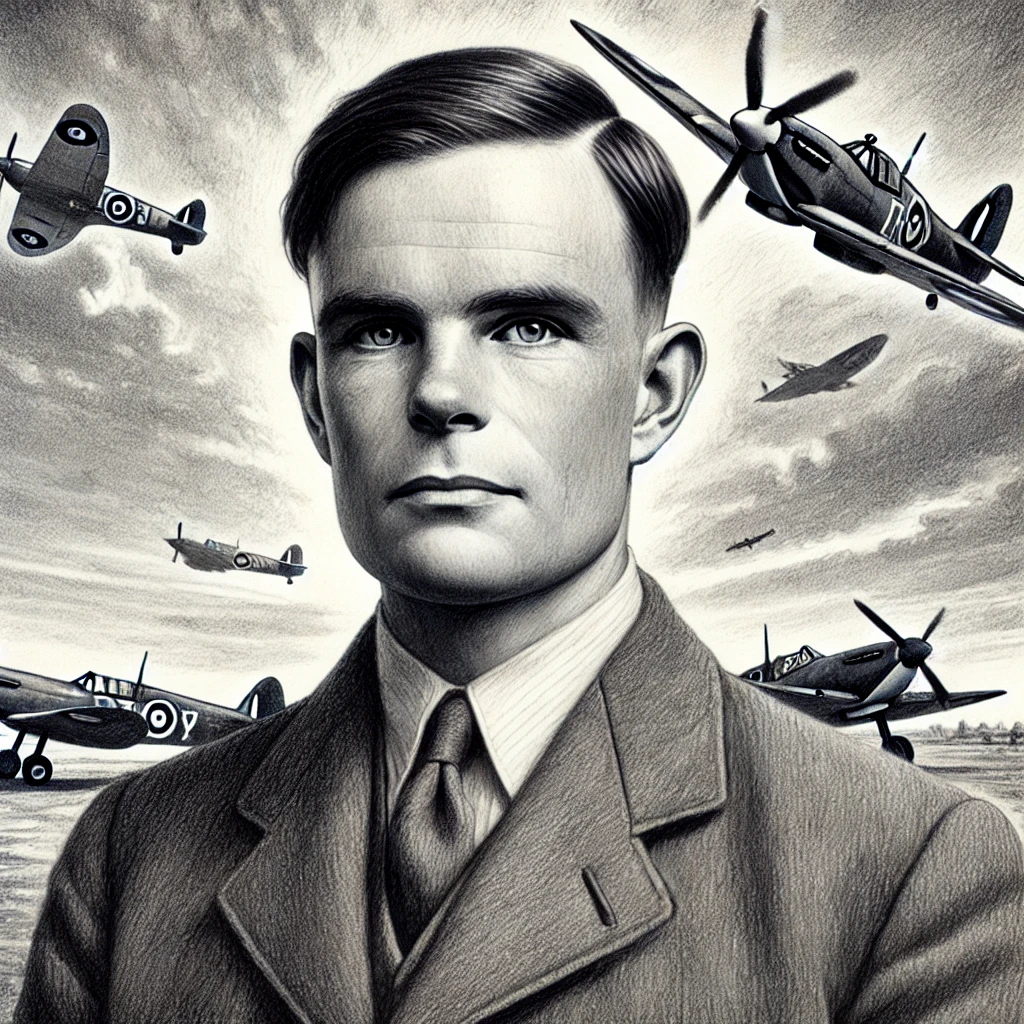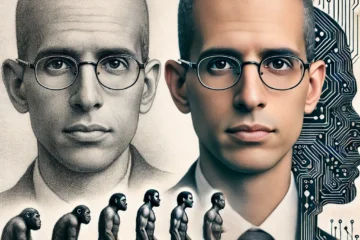
Alan Turing, standing heroically in front of a wartime background
Alan Turing: A Life of Genius, Innovation, and Injustice
Early Life and Education
Alan Mathison Turing was born on June 23, 1912, in Maida Vale, London, into a family of civil servants. From a young age, Turing exhibited remarkable intellectual abilities, particularly in mathematics and logic. His formal education at Sherborne School was challenging, as he found it difficult to fit in, largely due to his unconventional thinking and his inability to conform to societal expectations. However, Turing’s brilliance was soon recognized when he entered King’s College, Cambridge, where he would begin to shape ideas that would change the world.
The Birth of Modern Computing
Turing’s most significant academic contributions stemmed from his work in the early 1930s and 1940s. At Cambridge, he developed the idea of the Universal Turing Machine, a theoretical construct that would later form the backbone of the modern computer. The concept of a machine that could perform any calculation if given the appropriate instructions was revolutionary, and it paved the way for the development of computer science as we know it today. Turing’s work on algorithms and computation would prove vital in the creation of the computer.
But perhaps his most well-known achievement came during World War II, when he played a pivotal role in deciphering the Enigma code, used by Nazi Germany to encrypt their military communications. Turing’s ingenuity and the development of the Bombe machine helped crack Enigma, significantly aiding the Allied forces in their efforts to defeat Nazi Germany. Turing’s work is estimated to have shortened the war by several years, saving millions of lives.
Societal Rejection and Injustice
Despite Turing’s immense contributions to science and to the Allied victory, his personal life was overshadowed by the societal prejudice of the time. In 1952, Turing was arrested and convicted of “gross indecency” due to his homosexuality, which was illegal in the United Kingdom at the time. After his conviction, Turing was chemically castrated as part of his sentence, a punishment that ravaged both his health and his spirit.
The rejection he faced from society was devastating, considering that his mind had helped win a world war and lay the foundation for artificial intelligence and modern computing. Instead of being celebrated, he was treated with disdain, punished for his identity rather than his genius. Turing’s tragic end came on June 7, 1954, when he was found dead from cyanide poisoning, in what was presumed to be suicide.
Turing’s Legacy and the Struggle for Recognition
Turing’s life was a cruel reminder of how society can sometimes reject its most brilliant minds, particularly when those individuals do not conform to social expectations. While Turing’s intellectual contributions were ground-breaking, he was overshadowed by the prejudices of his time. His story serves as a poignant example of how a two-faced society can both admire and despise those who excel, forcing them to push against overwhelming odds.
Turing’s legacy, however, has undergone a profound transformation in the decades since his death. In 2009, British Prime Minister Gordon Brown issued a public apology for the way Turing had been treated, and in 2013, Queen Elizabeth II granted him a posthumous pardon. Today, Turing is rightfully celebrated as one of the founding fathers of computer science and artificial intelligence, with his work continuing to influence technological advancements.
Reflections on the Incongruence of Society’s Treatment of Turing
Turing’s life challenges us to reflect on the ways society treats its brightest individuals. Often, those who push boundaries and challenge norms are met with resistance, disdain, and rejection. This was certainly true in Turing’s case, where his sexuality was used as a weapon against him, even as he contributed immeasurably to the world.
The paradox of genius being punished by society is not unique to Turing. Many great thinkers, artists, and innovators have faced similar treatment, as society has often been slow to accept those who do not fit neatly into its predefined boxes. Turing’s story is one of resilience, but also one of tragedy, highlighting how societal norms can stifle greatness. It speaks to the wider issue of how those who excel may often be forced to do so in the face of great adversity.
Conclusion
Alan Turing was not only a visionary in the world of computing and artificial intelligence, but also a symbol of the injustices faced by those who challenge society’s norms. His story, though filled with pain and rejection, ultimately serves as a reminder of the profound impact that one individual can have on the world, despite overwhelming societal forces working against them. As we move forward, let Turing’s legacy inspire us to both value and celebrate brilliance in all its forms, irrespective of how society may perceive it.
Further Exploration
To better understand the life and impact of Alan Turing, consider exploring the following themes:
The Development of the Turing Machine: How Turing’s theoretical construct laid the foundation for modern computing.
Turing’s Role in World War II: A deeper look into his code-breaking efforts and their significance.
The History of Homosexuality in the UK: A historical examination of the legal and societal challenges faced by LGBTQ individuals in mid-20th-century Britain.
The Evolution of Artificial Intelligence: How Turing’s early ideas influenced the field of AI and its development in the 21st century.
References and Links:



0 Comments